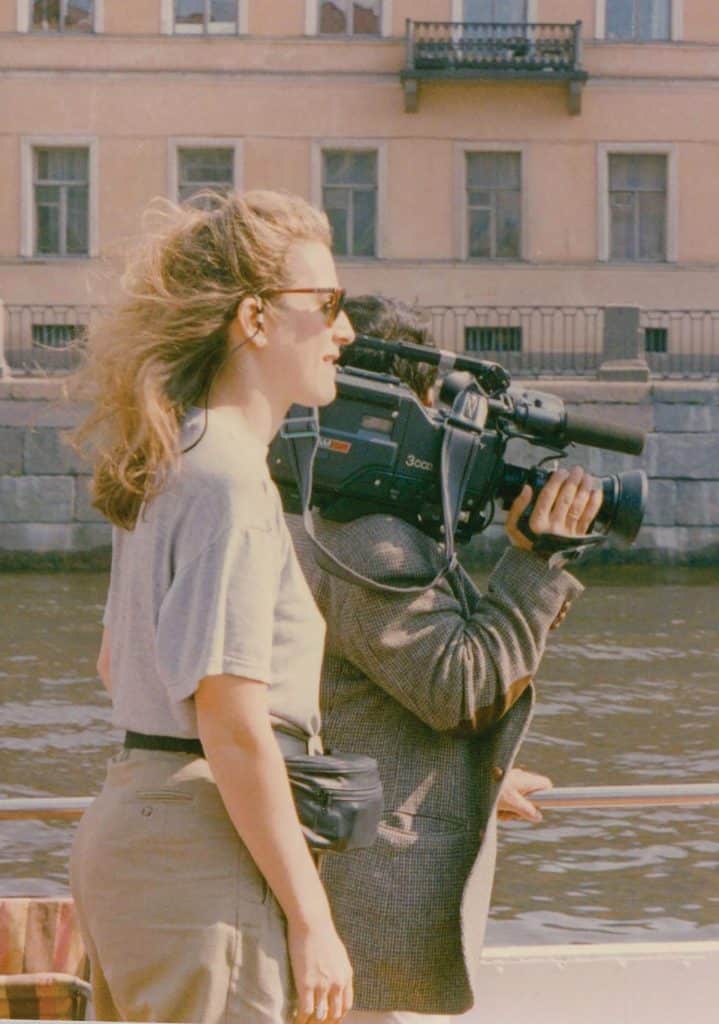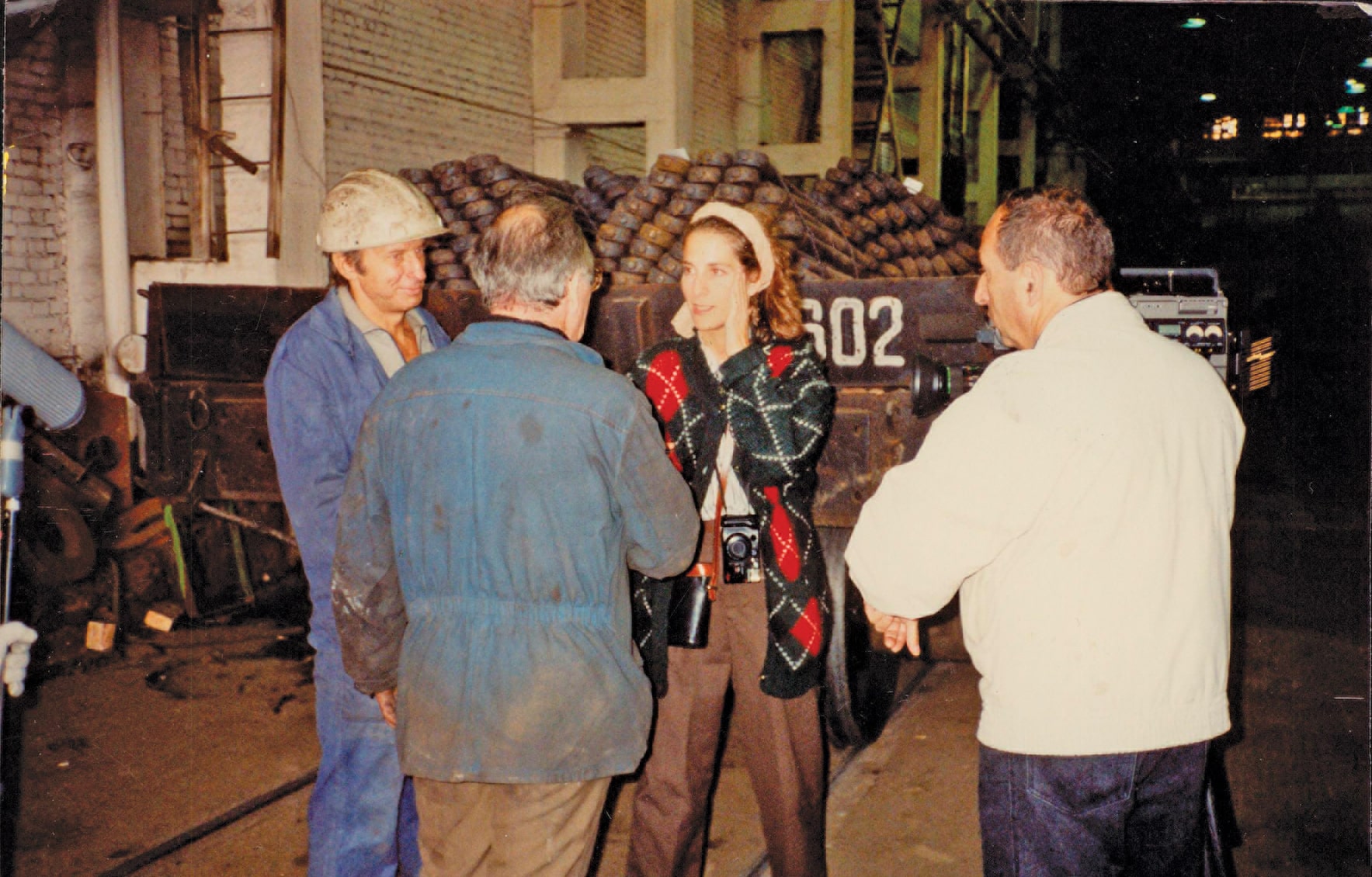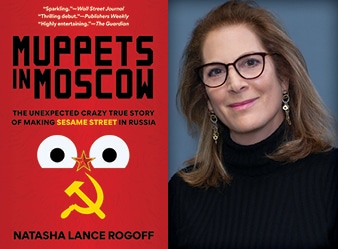All photos courtesy of Natasha Lance Rogoff
by Steve Desroches
In 1992 Natasha Lance Rogoff moved to Russia to be the executive producer of the Russian version of Sesame Street, or Ulitsa Sesam in Russian, a language she’d studied a decade earlier at Leningrad State University, which come the early 1990s was now renamed St. Petersburg University. Everything was changing in Russia. The collapse of the Soviet Union the year prior had sent the former superpower into a dizzying dimension of possibility and chaos as the populace struggled to shift from one system to another, with the West seeing potential for democracy and capitalism to take root in a country that had been ruled under communism and authoritarian regimes. Rogoff knew the country well. Throughout the 1980s she worked a journalist in the Soviet Union producing documentaries like Rock Around the Kremlin, Inside Gorbachev’s USSR, and Russia for Sale: The Rough Road to Capitalism for major networks. Rogoff was excited by this new opportunity not just to change gears from journalism to children’s television, but also to bring this groundbreaking program to a country just opening up to the ideals of free speech and expression embraced by the West. But as it turns out Rogoff didn’t know Russia as well as she thought she did, and the West was wildly naïve when it came to Russia and its future. And the message that she was in for quite the ride would be delivered by the very age group she was there to serve.
Just how much could be lost in translation, as well as the difficulty it would be to take a quintessential American institution and adapt it to Russian culture, became clear one day at Gorky Film Studio in Moscow when they held auditions for the children who would be cast in the show. Adorable boys and girls filed in and one by one came into the room where they were told to sing any song they liked. Rogoff recalls a little boy dropping his voice several octaves who then began to sing a song from World War II with lyrics like “the planet is burning and everything is lost.” And then a sweet girl came in and sang “Katyusha,” a Soviet-era folk song about a woman saying goodbye to her sweetheart who’s going off to battle. Child after child, this odd song selection continued.

“I was just stunned considering the lexicon of children’s songs in America,” says Rogoff. “This wasn’t the ‘Itsy Bitsy Spider’ or ‘Old MacDonald Had a Farm.’ A Russian colleague said to me that I needed to understand that these songs were sung to them by their grandmothers and they were a source of comfort. He said I shouldn’t focus on the lyrics, but on the lyrical.”
The challenges and joys of cross-cultural communication are wonderfully explained in Rogoff’s book Muppets in Moscow: The Unexpected Crazy True Story of Making Sesame Street in Russia, which she’ll discuss this Saturday evening at East End Books in conversation with Ed Christie, who designed the puppets for the show. Still a film and television producer Rogoff is also an Associate at Harvard University in the Art, Film and Visual Studies Department. She’s also a highly sought after expert on Russia considering her varied background and deep experiences with the country. Her commentary and viewpoints are increasingly requested since Russia’s invasion of Ukraine in 2022. Rogoff notes that the West didn’t recognize how frightening the 1990s were for everyday Russians. Even if they were happy to see a broken system end, all that decade was about for them was uncertainty as Russia tried to shift to democracy as the country descended into poverty and violence as the oligarchs came to power while Russia tried to embrace a “pseudo-capitalism” as Western companies saw a new emerging market and made millions while there was chaos and no rule of law in the country. Try making Sesame Street in that era.

The mixed production company had to consistently and effectively work to stick to the special kernel that makes Sesame Street such a beloved children’s show worldwide while also respecting the insistence from the Russians working on the show that Russian culture come front and center. The result was perhaps largely unrecognizable to Americans who love the show and perhaps a bit perplexing, though familiar to Russians who found such programming brand-new, but with references to Russian folklore. Perhaps the largest blind spot of all is how all of this Western influence and culture would be received. Rogoff notes that Russian President Vladimir Putin consistently refers to the 1990s and the state of the country then to justify Russia’s aggression, which he justifies as necessary to fight off the West. Rogoff’s perspective is fascinating and compelling as she can ably weave together a coherent narrative of a complicated time up until today. In the 1980s she reported on the persecution of LGBTQ citizens in the Soviet Union, a mainstay of Putin’s Russia. And she recalls the anger expressed by Putin when President Obama skipped the opening ceremony of the Winter Olympics in Sochi in 2014 as well as his vocal irritation that NBC sent Johnny Weir, a gay man with flair, to cover the Games. Though she makes no direct connection, Putin stunned the world when he invaded Crimea right after the Olympics ended, signaling a need to understand Putin and Russia differently since the end of the Cold War.
“We were quite naïve in our experiences in the nineties about the changes and how quickly we thought it would take for Russia to really change,” says Rogoff. “You can’t come out of 70 years of communism and think that it won’t take years, even decades, for Russia to really change.”
Natasha Lance Rogoff will be in conversation with Ed Christie at East End Books, 389 Commercial St., Provincetown, on Saturday, September 14 at 6 p.m. Tickets ($5/$25 with book/Free to those who need it) are available online at eastendbooksptown.com. For more information call 508.413.3225.











